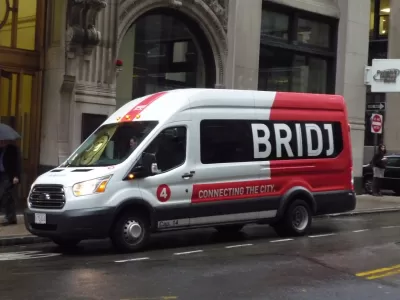Via Transportation Inc is picking up where Bridj left off—offering on demand ride sharing in cities in California and Texas.

Ride-share business Via has announced a partnership with the cities of West Sacramento, California and Arlington, Texas to provide on-demand ride sharing.
"Customers will set pick-up and drop-off locations on the Via app just like other ride-shares, and then a van will pick up several riders headed in the same direction and make multiple stops along a route devised in real time," explains Katie Pyzyk for Smart Cities Dive.
Service is expected to launch in Arlington in December 2017. The Via service will "replace the city's one existing bus line, 'the Max,' which runs one route connecting the University of Texas at Arlington and with transit center south of the Dallas/Fort Worth International Airport," according to Pyzyk. Via will also offer service in areas not covered by the Max, which is also a pilot program that will expire at the end of the year.
Local coverage is also available for each partnership, by Alice Barr in Arlington and Ellen Garrison in West Sacramento. A press release by Via Transportation Inc. also provides additional details on the new partnerships.
For a history of a high-profile precedent in on demand ride hailing, see Planetizen's coverage of the Bridj system, which launched in Boston in 2014 and ended operations three years later.
FULL STORY: 2 cities partner with ride-share service Via for public transit alternatives

Planetizen Federal Action Tracker
A weekly monitor of how Trump’s orders and actions are impacting planners and planning in America.

Chicago’s Ghost Rails
Just beneath the surface of the modern city lie the remnants of its expansive early 20th-century streetcar system.

San Antonio and Austin are Fusing Into one Massive Megaregion
The region spanning the two central Texas cities is growing fast, posing challenges for local infrastructure and water supplies.

Since Zion's Shuttles Went Electric “The Smog is Gone”
Visitors to Zion National Park can enjoy the canyon via the nation’s first fully electric park shuttle system.

Trump Distributing DOT Safety Funds at 1/10 Rate of Biden
Funds for Safe Streets and other transportation safety and equity programs are being held up by administrative reviews and conflicts with the Trump administration’s priorities.

German Cities Subsidize Taxis for Women Amid Wave of Violence
Free or low-cost taxi rides can help women navigate cities more safely, but critics say the programs don't address the root causes of violence against women.
Urban Design for Planners 1: Software Tools
This six-course series explores essential urban design concepts using open source software and equips planners with the tools they need to participate fully in the urban design process.
Planning for Universal Design
Learn the tools for implementing Universal Design in planning regulations.
planning NEXT
Appalachian Highlands Housing Partners
Mpact (founded as Rail~Volution)
City of Camden Redevelopment Agency
City of Astoria
City of Portland
City of Laramie




























